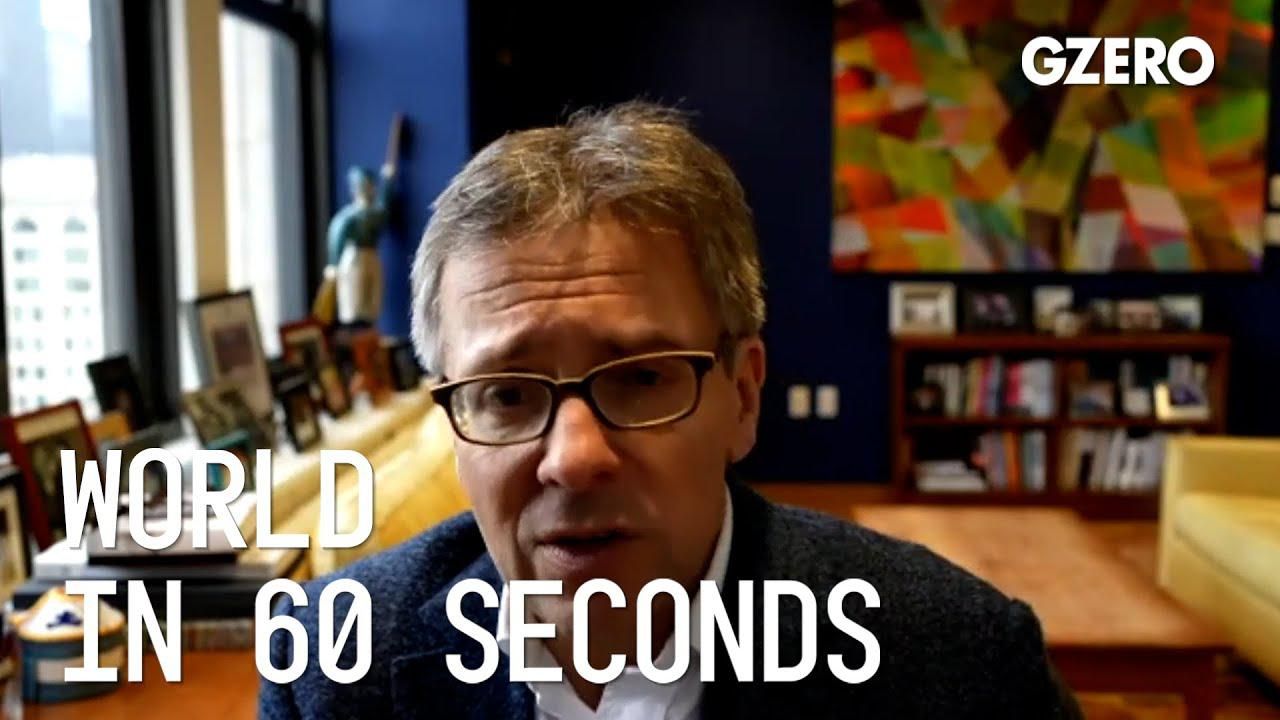As Russian troops approach Kyiv, what will happen if it falls? How has the West reacted to Lavrov's UN speech? Will Taiwan be the next Ukraine? Ian Bremmer shares his insights on global politics this week on World In :60.
First, as Russian troops approach Kyiv, what will happen if it falls?
I think it's increasingly what will happen when it falls. I hate to say that. Unless the Russians lay down arms in large numbers because they don't want to fire on their brothers and sisters, the Ukrainians, which is possible and I hold out hope. But it doesn't look very likely thus far. The Russian force will overwhelm the Ukrainians as it is buried upon Kyiv. Look, what's going to happen is you're going to get a government in exile that will either be in the west of Ukraine conceivably, but that's a rump Ukraine that I can't imagine the Russians want, or they move to another country, Poland, maybe France.
Then we have a proxy war going on where the West is continuing to provide weapons going to partisans on the ground in Ukraine. This does not get better. This is a full economic decoupling from Russia with Europe and the United States. This is massive economic damage to the Russian economy, the Belarusian economy, of course the Ukrainian economy too. The Russians don't seem thus far to be backing down. I can't see any room for rebuilding the relationship or for negotiations to be successful. Hold out hope. They had yesterday, again, five hours of talks. But so far, everything we see on the ground is that the Russians are only escalating at this point. That means only very bad things for the Ukrainian people.
How has the West reacted to Lavrov's UN speech?
We're talking about Foreign Minister Lavrov, Sergey Lavrov, who is no stranger to the United Nations. He was ambassador to the UN for Russia for about a decade and was one of the most effective ambassadors on the ground in the UN. Everyone had respect for him, even if they didn't like him. But that is not true anymore. A large majority, I don't have the exact numbers, but a large majority of everyone attending in the United Nations walked out as Lavrov began the speech because, of course, this government is increasingly perceived as one of war criminals by advanced industrial democracies and even many poorer democracies around the world.
The Chinese as well increasingly publicly saying that they're deeply unhappy with the invasion of Ukraine, and they want to see a cease fire and the Russian troops leave. This is very far from where the Russians and the Chinese were back when Putin just three, four weeks ago was in Beijing signing this big new friendship agreement with Xi Jinping. The Russians have lost not just a lot of enemies and made them much more hostile, but they've also lost, or at least weakened, a lot of their friendships.
Will Taiwan be the next Ukraine?
The answer is no. Interesting, a bunch of friends of mine are presently in Taiwan on a mission sent by the Biden administration, Republicans and Democrats, to show the Taiwanese that the Americans are committed. But more importantly, given what I just said about China, Chinese are not looking to be seen as opportunists taking advantage of this crisis, because if that were the case, they would be seen as on the Russian side of an emerging, evolving second Cold War. Absolutely not where the Chinese are right now. So I actually feel that Taiwan is ... I wouldn't say comfortable, I wouldn't say sitting pretty because long term, the power imbalance away from Taiwan is very clearly in Beijing's favor. But on the back of this invasion in Ukraine, I'd be stunned to see an intervention that made Taiwan into a real additional crisis. I really don't think that's something we have to worry significantly about.
- The US is at war with Russia: 4 scenarios from here - GZERO Media ›
- The Graphic Truth: The cost of the crisis for Ukraine - GZERO Media ›
- Zelensky's next move? - GZERO Media ›
- What We're Watching: Zelensky stays put as EU, US sanction Putin ... ›
- Explainer: Why there’s a Y in Kyiv, but no “the” in Ukraine - GZERO Media ›
More For You
100 million: The number of people expected to watch the Super Bowl halftime performance with Bad Bunny, the Puerto Rican superstar and newly minted Album of the Year winner at the Grammys.
Most Popular
Think you know what's going on around the world? Here's your chance to prove it.
An imminent US airstrike on iran is not only possible, it's probable.
Americans are moving less — and renting more. Cooling migration and rising vacancy rates, especially across the Sunbelt, have flattened rent growth and given renters new leverage. For many lower-income households, that relief is beginning to show up in discretionary spending. Explore what's changing in US housing by subscribing to Bank of America Institute.
